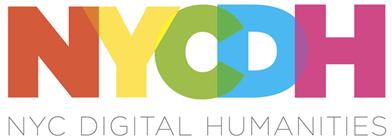Hello,
In case your students are still looking for DH courses for Fall 2022, I wanted to share that I am teaching a graduate DH theory-practice seminar in the Cinema Studies department at Tisch. Here’s the info – feel free to reach out if you have any questions mh193[at]nyu[dot]edu
Cinema & the Digital Humanities: History, Concepts and New Approaches to the Study of Moving Images
Tuesdays, 12:30-4:30pm
Room 635
CINE-GT 3040
Cinema Studies students: Section 001 / class # 20132
Outside students: Section 002 / class # 20133
4 points
This course will explore Cinema Studies within the interdisciplinary context of the Digital Humanities (DH). Digital tools and platforms, along with the databases they create, have expanded the ways we study moving images and filmmaking traditions. Despite Cinema Studies’ important contributions to the expansion of DH, the study of moving images and time-based media is usually not at the forefront of DH-related inquiry. One of the course objectives is to therefore place Cinema Studies research at the center of DH methodologies in order to diversify interdisciplinary approaches to both DH and Cinema Studies. In this course, students will study DH practice alongside related theoretical frameworks in order to explore the profound historiographical, philosophical, sociocultural, and institutional imperatives that drive the need for digital tools and computational methods in the study of moving images. This approach will help students establish in-depth connections between theory and practice, and will assist them in planning, prototyping, and creating their own final projects to address significant research questions related to Cinema Studies and other fields.
Part I of the course will focus on a historical and critical exploration of pre-digital and early digital Cinema Studies projects that prefigure the interactive, data-driven, cartographic/spatial, and/or computational logic of current DH tools. We will cover a broad historical range of critical making that includes the works of early film theorists-practitioners (such as Lev Kuleshov, Dziga Vertov, and Sergei Eisenstein), collaborations between computer scientists and artists (including the Bell Labs 1960s experiments), as well as more recent digital projects and tools (by Yuri Tsivian, Adelheid Heftberger, Anne Friedberg, Steve F. Anderson, and many others). In addition, Part I of the course will analyze DH projects that contribute to a relatively new subfield in Cinema Studies: “new cinema history,” which refers to a cluster of new methodologies and digital tools for studying the cultural and social histories of cinema and its audiences. We will explore the impact of this new cinema history and of “distant reading” (the collection and computational/statistical analysis of large amounts of text data, rather than the close reading of individual texts) on traditional methodologies in Cinema Studies, through the work of influential DHers such as Deb Verhoeven, Richard Maltby, and Jeffrey Klenotic. Our analysis of these projects will not only focus on technical and methodological aspects, but also on the intellectual, cultural, ethical, and institutional debates regarding the use of digital and open-access platforms in the Humanities.
Part II of the course will provide hands-on DH training through workshops that will introduce students to a variety of DH tools and platforms, including data visualization, text mining, glitching/data-bending, mapping, annotations, digital archiving, collaborative authoring, film forensics, volumetrics, interactive design, databases, and critical remixing. The workshops will help students acquire a diverse set of skills for analyzing moving images, and will provide them with tools to use in their final projects and other class activities. The scope of the workshops will be adjusted according to student interests. Final project options include: conceptualizing and designing new analytical tools, creating new platforms for the digital analysis of moving images, curating digital/digitized artifacts/collections, using existing DH tools for a new research project, activist work, critically remixing archival material/found footage, contributing content to an existing DH initiative, producing multimedia scholarship (including videographic criticism), or using an online authoring platform (such as Scalar, Omeka, Mapme, and StoryMaps) for an academic research paper.
Course assignments include short response papers (part I of the course), presentations (I & II), software reviews (II), prototype design or project outline (II), and a final project (II). The course is suitable for all levels of technical expertise. Students are encouraged to keep an open mind and a willingness to experiment outside their comfort zone.
